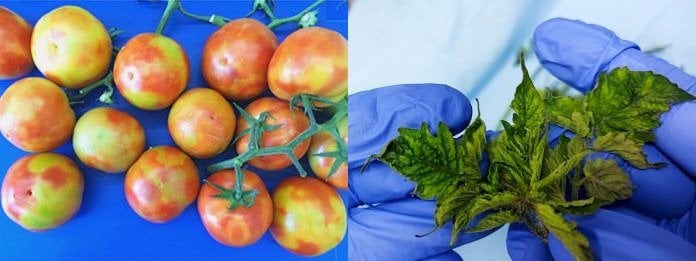Tomato troubles: Veggie virus threatens to squash Australia's multi-billion-dollar industry
- Replies 25
The tranquillity of Australia's vast agricultural landscape has been disrupted by the unwelcome arrival of a highly contagious virus known to target some of the nation's most beloved vegetables.
It faces a new challenge as a recently detected disease has raised concerns for the nation's multi-billion-dollar vegetable industry.
The discovery has sparked fears of potential widespread impact, with authorities moving swiftly to address the situation.
For the first time, the Tomato brown rugose fruit virus (ToBRFV) has been detected in South Australia, sending a wave of concern across the $5.8 billion vegetable industry that stands as a cornerstone of the Australian economy and a source of livelihood for thousands.
ToBRFV, while posing no known threats to human health, has been deemed a ‘considerate threat’ to the agricultural sector, particularly affecting tomatoes, capsicums, and chillies.
The virus was identified at two separate properties within the Northern Adelaide Plains region, sparking immediate action from the Department of Primary Industries and Regions (PIRSA).

The detection of such a disease is a stark reminder of the delicate balance within our ecosystem and the ever-present need for vigilance in protecting our agricultural heritage.
PIRSA has taken the helm in this crisis, launching an investigation to trace the source of the outbreak and assess the potential for further spread.
‘Response and surveillance measures are underway, and PIRSA is working closely with the affected businesses with quarantine measures implemented at the properties,’ it stated.
South Australian Chief Plant Health Officer Nick Secomb has issued a call to action for growers, saying, ‘Growers are urged to look out for signs of tomato brown rugose fruit virus and report anything unusual to ensure early detection.’
According to him, biosecurity is ‘everyone’s responsibility’.
‘Infected plants show symptoms such as mosaic patterns, yellowing and deformities on leaves, while fruits develop brown wrinkled spots, deformations and uneven ripening, reducing their yield and marketability. Different plant varieties can present different symptoms,’ PIRSA explained.
ToBRFV can decrease marketable yields by as much as 15 per cent in tomatoes.
The virus is included on the National Priority Plant Pest list, and growers who suspect it may have spread to their plants or crops are encouraged to promptly contact the Exotic Plant Pest Hotline at 1800 084 881.
Growers worried about the impact of the ToBRFV outbreak on their operations can access free support through PIRSA’s Family and Business (FaB) mentor service.
While Australia's vegetable industry faces a significant threat from a newly discovered tomato disease, there are still innovative methods that home gardeners can explore to ensure healthy and robust tomato crops.
Amidst concerns over potential crop losses, a new technique has emerged that promises to boost the quality of homegrown tomatoes, offering hope to those looking to cultivate resilient plants in their own backyards.

Have you noticed changes in the quality or availability of your favourite vegetables? How do you think we can better protect our agricultural industry from such threats? Join the conversation below, and let's discuss the importance of plant health and biosecurity in preserving Australia's future food security.
It faces a new challenge as a recently detected disease has raised concerns for the nation's multi-billion-dollar vegetable industry.
The discovery has sparked fears of potential widespread impact, with authorities moving swiftly to address the situation.
For the first time, the Tomato brown rugose fruit virus (ToBRFV) has been detected in South Australia, sending a wave of concern across the $5.8 billion vegetable industry that stands as a cornerstone of the Australian economy and a source of livelihood for thousands.
ToBRFV, while posing no known threats to human health, has been deemed a ‘considerate threat’ to the agricultural sector, particularly affecting tomatoes, capsicums, and chillies.
The virus was identified at two separate properties within the Northern Adelaide Plains region, sparking immediate action from the Department of Primary Industries and Regions (PIRSA).

The Tomato brown rugose fruit virus (ToBRFV) has been detected in South Australia, threatening Australia’s $5.8 billion vegetable industry. Credit: PIRSA
The detection of such a disease is a stark reminder of the delicate balance within our ecosystem and the ever-present need for vigilance in protecting our agricultural heritage.
PIRSA has taken the helm in this crisis, launching an investigation to trace the source of the outbreak and assess the potential for further spread.
‘Response and surveillance measures are underway, and PIRSA is working closely with the affected businesses with quarantine measures implemented at the properties,’ it stated.
South Australian Chief Plant Health Officer Nick Secomb has issued a call to action for growers, saying, ‘Growers are urged to look out for signs of tomato brown rugose fruit virus and report anything unusual to ensure early detection.’
According to him, biosecurity is ‘everyone’s responsibility’.
‘Infected plants show symptoms such as mosaic patterns, yellowing and deformities on leaves, while fruits develop brown wrinkled spots, deformations and uneven ripening, reducing their yield and marketability. Different plant varieties can present different symptoms,’ PIRSA explained.
ToBRFV can decrease marketable yields by as much as 15 per cent in tomatoes.
The virus is included on the National Priority Plant Pest list, and growers who suspect it may have spread to their plants or crops are encouraged to promptly contact the Exotic Plant Pest Hotline at 1800 084 881.
Growers worried about the impact of the ToBRFV outbreak on their operations can access free support through PIRSA’s Family and Business (FaB) mentor service.
While Australia's vegetable industry faces a significant threat from a newly discovered tomato disease, there are still innovative methods that home gardeners can explore to ensure healthy and robust tomato crops.
Amidst concerns over potential crop losses, a new technique has emerged that promises to boost the quality of homegrown tomatoes, offering hope to those looking to cultivate resilient plants in their own backyards.
Key Takeaways
- The Tomato brown rugose fruit virus (ToBRFV) has been detected in South Australia for the first time, posing a threat to Australia's $5.8 billion vegetable industry.
- ToBRFV affects tomatoes, capsicums, and chillies but has no known human health effects yet can significantly impact plant health and crop yields.
- The Department of Primary Industries and Regions (PIRSA) is conducting an investigation and has put quarantine measures in place to control the spread of the virus.
- Growers were urged to watch for symptoms and report any unusual plant behaviour; biosecurity is everyone's responsibility, and PIRSA is offering support to concerned growers.
Last edited:







